Here what’s in store for you this week:
- We share the anti-war statements of our Editor-in-Chief Dmitry Muratov and Syndicate 100, the coalition of independent Russian media outlets led by Novaya;
- We explain how the Kremlin has swallowed its own propaganda;
- Plus, we report on the growing resistance from ordinary Russian citizens to Putin’s war against Ukraine
We Condemn Putin’s War
Novaya unequivocally condemns President Putin’s unprovoked and horrific war against Ukraine. Our Editor-in-Chief, Dmitri Muratov, spoke out:
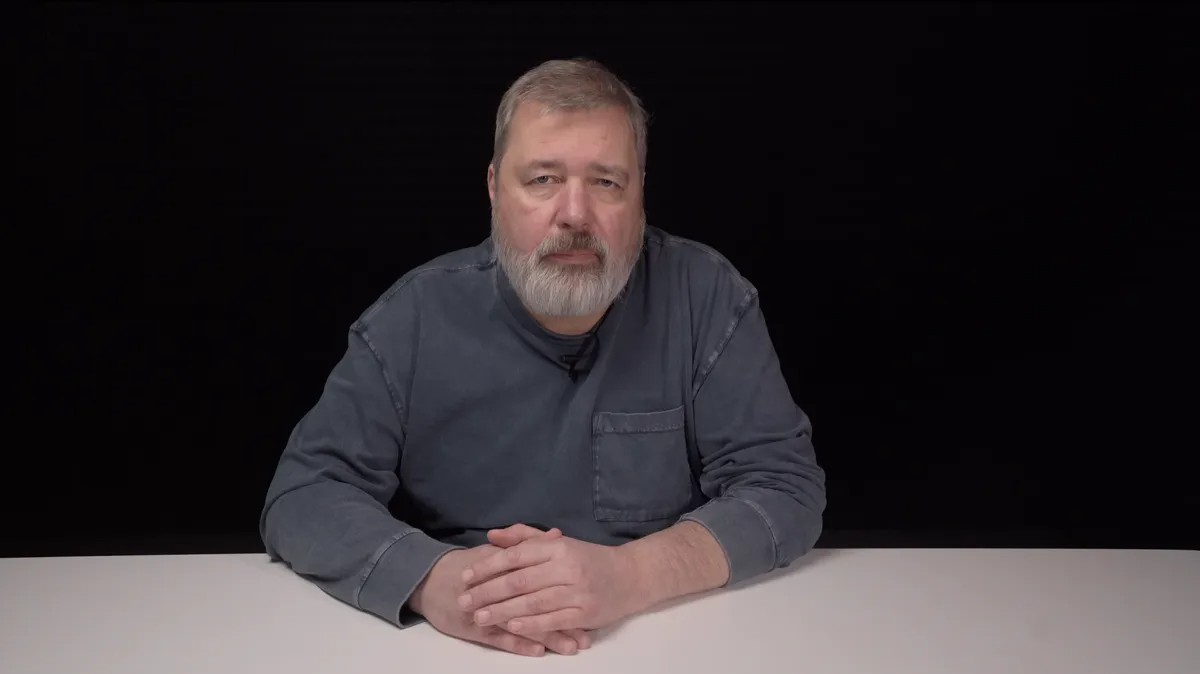
We all gathered at the editorial office early today. We are grieving.
Our country, on the orders of President Putin, started a war with Ukraine. And there is no one to stop the war. Therefore, along with grief, we are ashamed.
In the hands of the commander-in-chief, he holds the “nuclear button” like the keys to a car. And he says the next step is a nuclear salvo? I can’t interpret Vladimir Putin’s words about retaliation in any other way.
This week we will publish this issue of Novaya Gazeta in two languages
- Ukrainian and Russian. We do not recognise Ukraine as an enemy; we do not recognise the Ukrainian language as the language of the enemy. We never will.
And the last thing: Only an anti-war movement Russian citizens can save life on this earth.
Watch Muratov deliver his address.
Novaya leads a coalition of 25 independent media outlets, “Syndicate 100”. We penned a joint statement calling for an end to this barbaric war.
Today, Russian President Vladimir Putin started a war with Ukraine. Pain, anger and shame are three words that reflect our attitude to what is happening. This invasion will bring grief to the families of thousands of people in Ukraine and Russia. This is a large-scale war in which other states will also be involved. Since the Cuban Missile Crisis, the world has never been so close to a global catastrophe.
We, as independent Russian journalists, declare that we are against the massacre initiated by the Russian leadership.
We promise that we will be honest about what is happening while we have this opportunity. We wish resilience and strength to the people of Ukraine who are resisting aggression, and to all in Russia who are now trying to resist this militaristic madness.
We also appeal to those who are trying to rationalise the motivations for the war, justifying its start by the need to protect themselves from NATO and “Ukrainian Nazism”. War is no longer just an argument on television and in kitchens. It has been made flesh. There are tanks in Kharkiv. And in a real war, people always die. We hope that death will not come to your house. But, of this, there can be no certainty.
No to war.
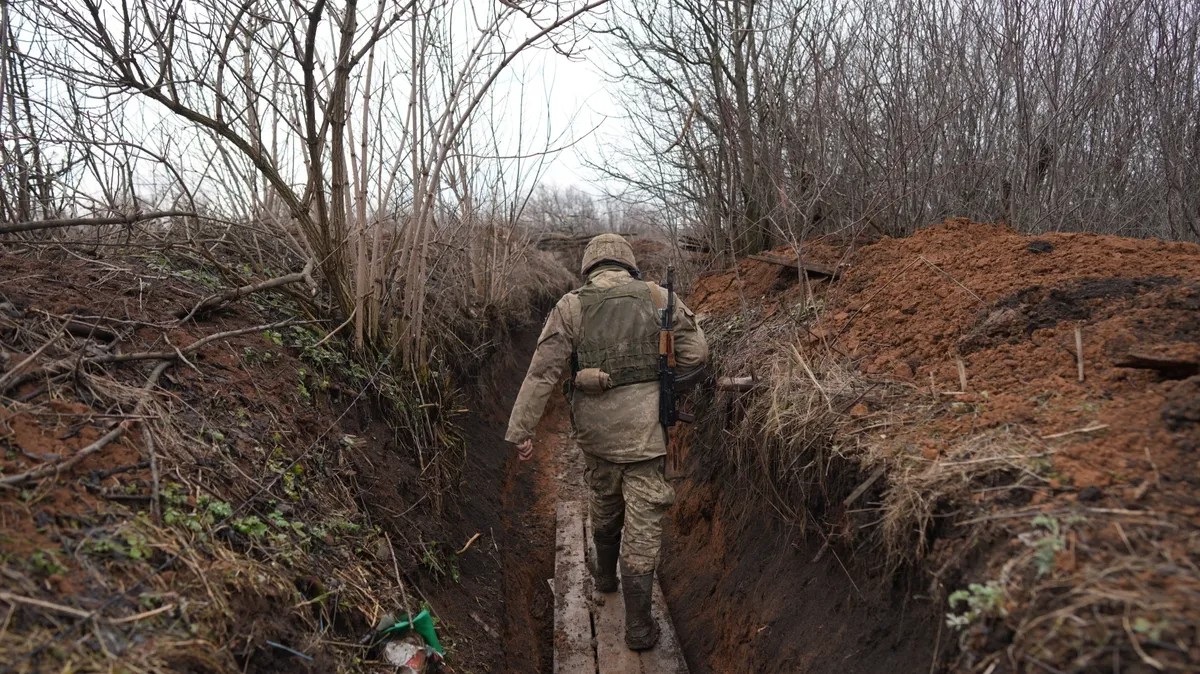
Ukranian soldier. Photo: AP / TASS
How the Kremlin Swallowed its Own Propaganda
One of our articles published in Ukrainian was our political editor Kirill Martynov’s sober analysis of the road ahead. He takes aim at the Russian propaganda machine, the price of indifference, and the untold pain the war will bring to Ukrainians and Russians alike. To conclude, he highlights the indispensable role that independent journalists will play in the dark days ahead.
ON HOW PUTIN HAS DUG RUSSIA’S GRAVE:
“Hatred will poison Russia's relations with all its neighbours, split families apart, destroy friendships […] The blood of civilians will be on the hands of the aggressor.”
ON PUBLIC PERCEPTIONS AND STATE PROPAGANDA:
Martynov describes the sickening feeling of foreboding created by the statements of State propagandists:
“In recent months, Russian officials and propagandists on state television, as if they knew something, reported that such a state would soon not exist at all.”
He also reflects on the chasm between State and Society:
“I refuse to believe that Russians support the bombing of Kyiv.[…] They [the Kremlin] didn't ask us if we wanted to live in a warring country […] we are considered in our native country neither as citizens nor as people entitled to basic human dignity.”
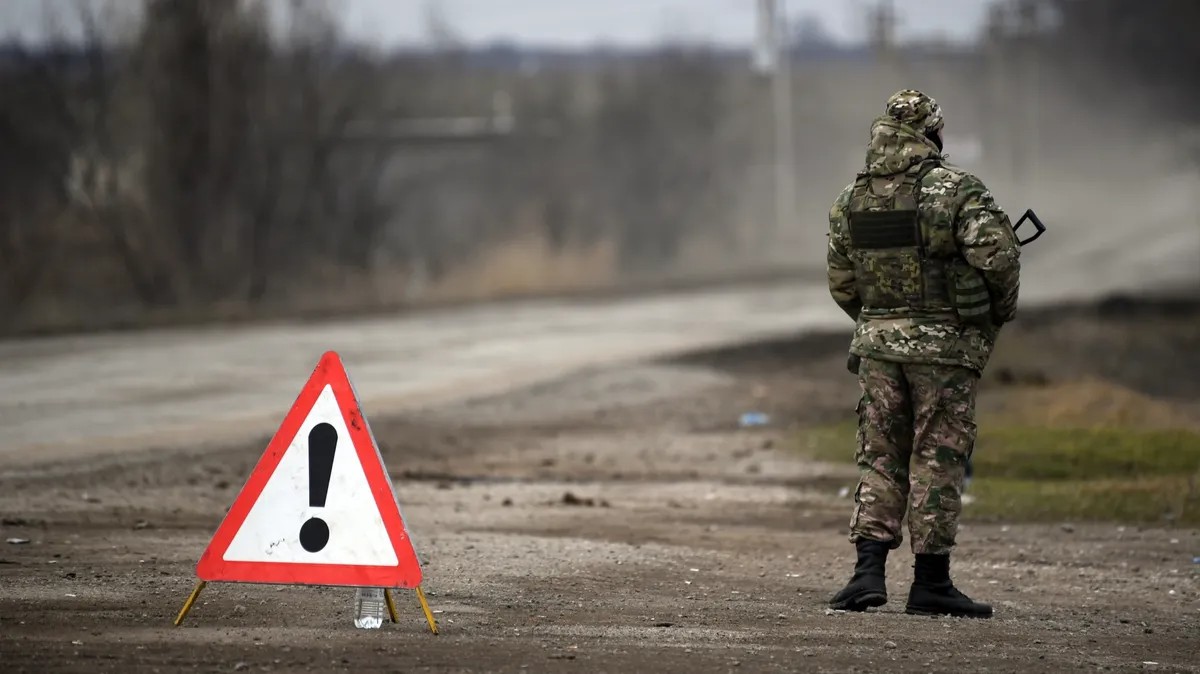
Russian militarist near the Ukranian Border. Photo by RIA Novosti
ON HOW THE KREMLIN BELIEVES ITS OWN HYPE:
“The inhabitants of the Kremlin have been feeding on their own propaganda for too long. The cult of violence, the beat of tin drums […] They believed that the world was hostile and decided to strike first. Viewer #1 saw the truth on his screen and decided to adjust the world accordingly.”
Поддержите
нашу работу!
Нажимая кнопку «Стать соучастником»,
я принимаю условия и подтверждаю свое гражданство РФ
Если у вас есть вопросы, пишите [email protected] или звоните:
+7 (929) 612-03-68
ON THE ROLE OF INDEPENDENT JOURNALISTS:
“If propaganda created the war, then facts can resist it. Journalists are not soldiers, we are unarmed. But we will work in war so that society remembers that war is terrible […] We will check each and every official summary, we will not hide anything. We will probably have to do our work under military censorship.”
ON WHY RUSSIANS MUST SAY NO TO WAR:
“Nobody will protect Ukraine, except Ukrainians. No one but the Russians who say ‘No to war’ can stop our own national catastrophe.”
The View from Rostov
The southern Russian city of Rostov-on-Don lies just over 100 kilometres from the Ukrainian border. After Putin announced the recognition of the so-called DNR and LNR as independent countries, the occupying authorities began forcibly evacuating residents from these regions to the Russian city. As of February 24, Rostov’s temporary accommodation centres were hosting 6,231 such refugees. Now, as Russia continues its onslaught against Ukraine, this number is likely to rise — and so too are the tensions in the city. Our correspondent Elena Romanova reports from the scene.
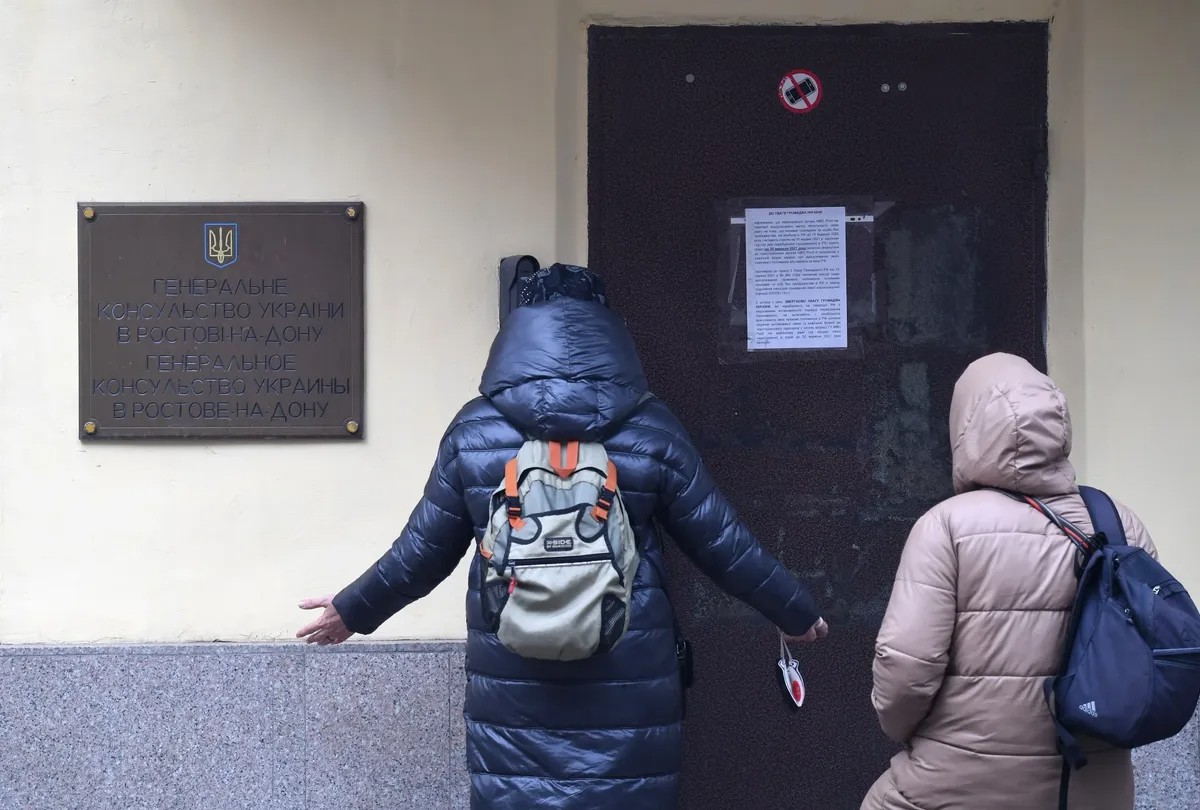
Two women in front of the closed ukranian embassy in Rostov-on-Don. Photo by RIA Novosti
TEMPORARY ACCOMMODATION CENTRES. There are now 282 of these in the Rostov region, many in re-purposed sanatoriums, motels, and young pioneer camps. Authorities say they will reimburse the owners of these establishments for the accommodation and meals they provide to refugees, but the latter are suspicious, since “Many people remember the experience of 2014 when the money allocated for the accommodation of Ukrainians had to be literally beaten out of officials.”On Monday, February 21, SPIEGEL journalists were not allowed into the sports hall of one of the schools in Taganrog due to «anti-terrorist measures.»
DWINDLING RESOURCES. Local people working with refugees believe that, despite the tense situation, Rostov is coping with the influx — so far. “Direct and indifference reign in the Rostov cities bordering Ukraine”, writes Romanova. Member of the ‘Just Russia — For Truth!’ party Yuri Mezinov tells Novaya that “This is a predictable situation, we faced it in 2014. In a week or two, people will run out of money […] we must be prepared.”
SOMETHING TO HIDE? It is very difficult for journalists to gain access to refugees. The authorities explain the difficulty with the need for anti-Covid precautions, yet State media employees have no trouble getting through. Foreign journalists, too, are barred from entering temporary accommodation centrs.
ANTI-REFUGEE SENTIMENT. “Rostovites”, writes Romanova, “are indifferent to refugees […] Social networks do not shine with empathy.” Some of this negative sentiment is the result of the worsening economic situation post-2014. Then, between 40-50 thousand Donbas residents settled in Rostov, many of them selling their labour at a knock-down price, thus making it harder for local people to find work.
TRUST IN PUTIN. Despite the bleak situation, neither the local residents nor the refugees who Romanova was able to talk to expressed any dissatisfaction with the President. She spoke to one woman, Tatyana, who — when asked about the impending sanctions that will make life harder for ordinary Russians — replied, “Putin probably has his own plans. He has already resolved many situations for the better.” On the refugees, Romanova remarks that the limitations the authorities place on access to them are “strange” because most of them say that “Putin is great”. “Whoever thinks otherwise”, Romanova writes,”has either left Donetsk and Luhansk in the other direction, or will never say so out loud.”
Read Romanova’s full report here.
How Russians Are Saying No To War
Despite what the Kremlin talking heads on Perviy Kanal or Rossiya 24 may say, not all Russians support Putin’s invasion of Ukraine. Tatyana Kolobakina and Alexei Sviridov interview just some of the Russians who have said no to the Kremlin’s war, while Daria Kozlova — together with Kolobakina — reports on the anti-war protests in the centre of Moscow.
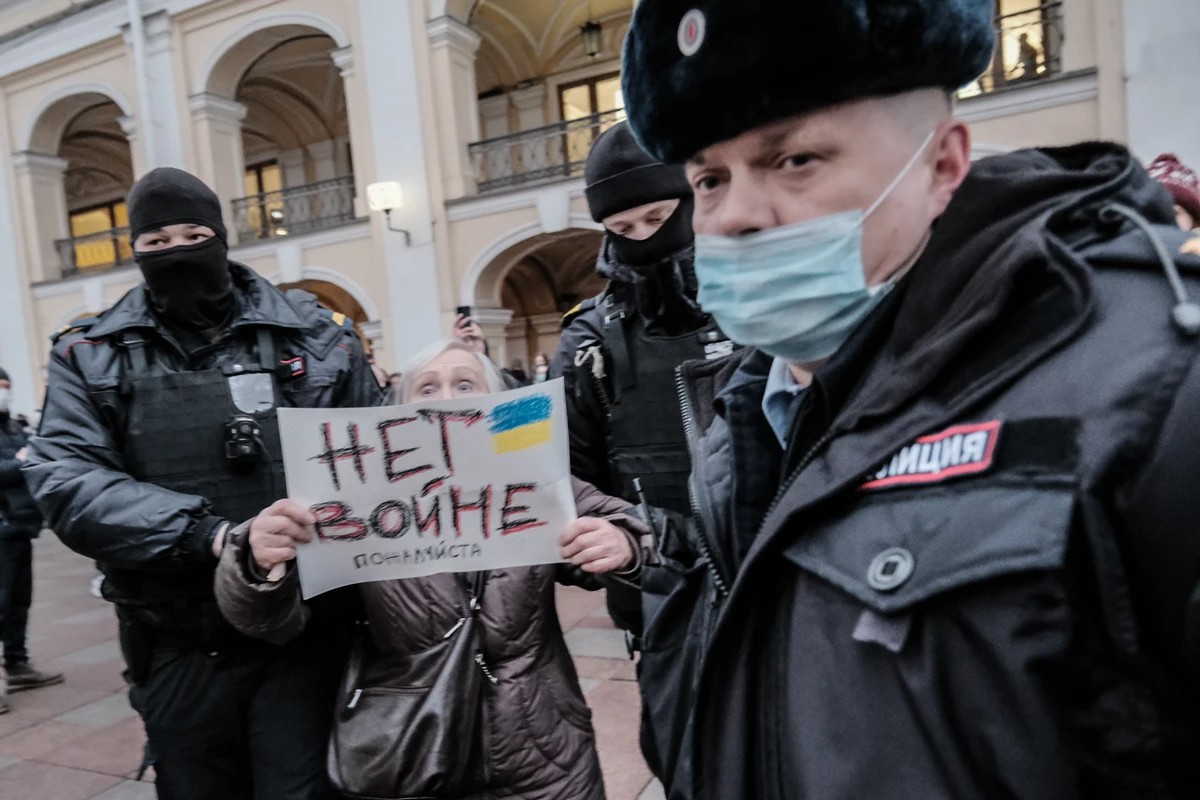
Photo by Artem Leshko / Novaya Gazeta
STREET PROTESTS. Many of Russia’s major cities have seen anti-war protests since the invasion began. In Moscow, the day Putin made the declaration of war, several thousand people marched along the city’s major thoroughfares chanting “Shame!”, “Ukraine is not our enemy!”, “Putin, withdraw the troops!”. OVD-Info reported that, as of midnight on February 24-25, police had detained 957 people. A similar protest took place in Russia’s northern capital, St. Petersburg, on the same day. Around 2,000 people gathered in the square near Gostiny Dvor and did not disperse for almost five hours despite a harsh response from the police. They chanted “No to war!”, gave flowers to each other, and held single pickets. According to human rights activists, at least 430 participants of the action were detained. Among them, a 14-year-old, and an elderly woman who had survived the Nazi siege of Leningrad.
SOCIAL MEDIA. Russians have been far from silent on social media in the build up to — and now unfolding of — the invasion of Ukraine. When Vladimir Putin recognized the so-called Donetsk and Luhansk “People’s Republics”, the independent outlet Kholod launched the hashtag#IAmNotSilent: “With this action we want to break the circle of silence and remember that we are strongly connected with Ukraine”, they said. Hundreds joined the Twitter flashmob. Taisiya Bekbulatova, Kholod’s Editor-in-Chief, told Novaya: “No one has taken away our right to speak out and we should use it in such situations.”
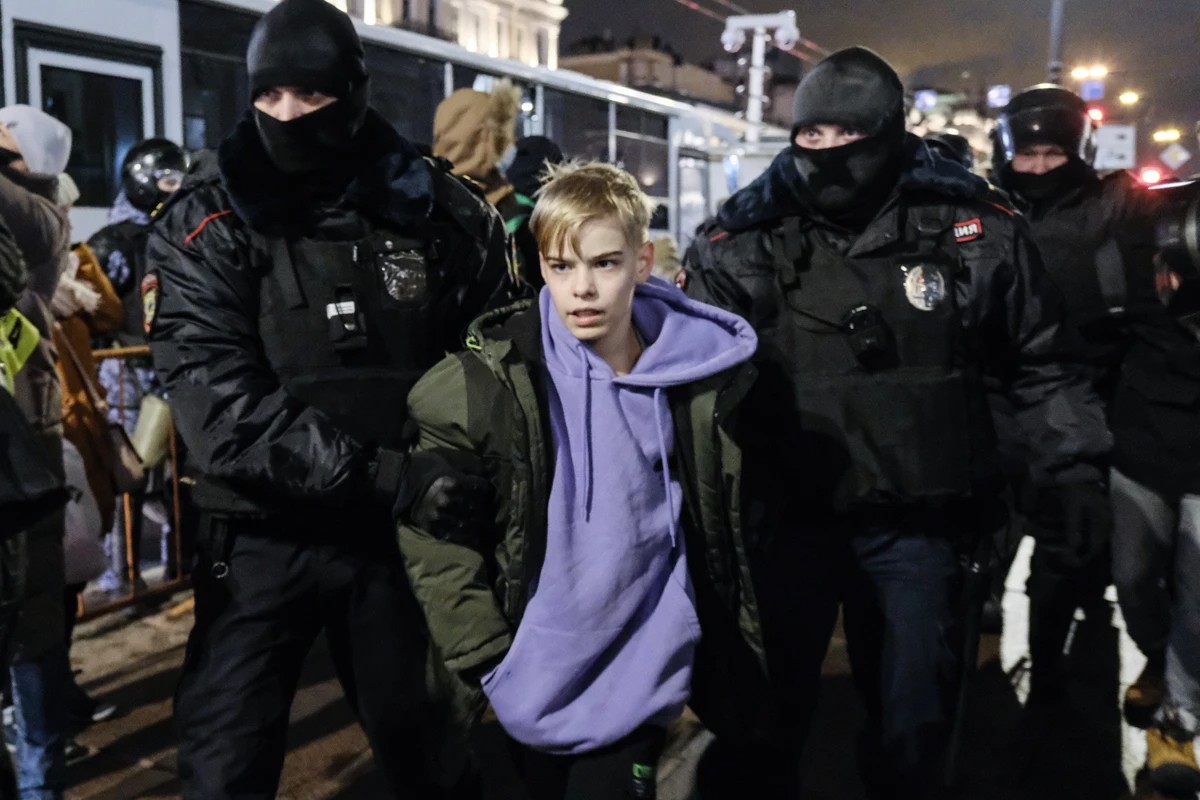
Detention during the call-for-peace in Ukraine action in Petersburg. Photo by Artem Leshko / Novaya Gazeta
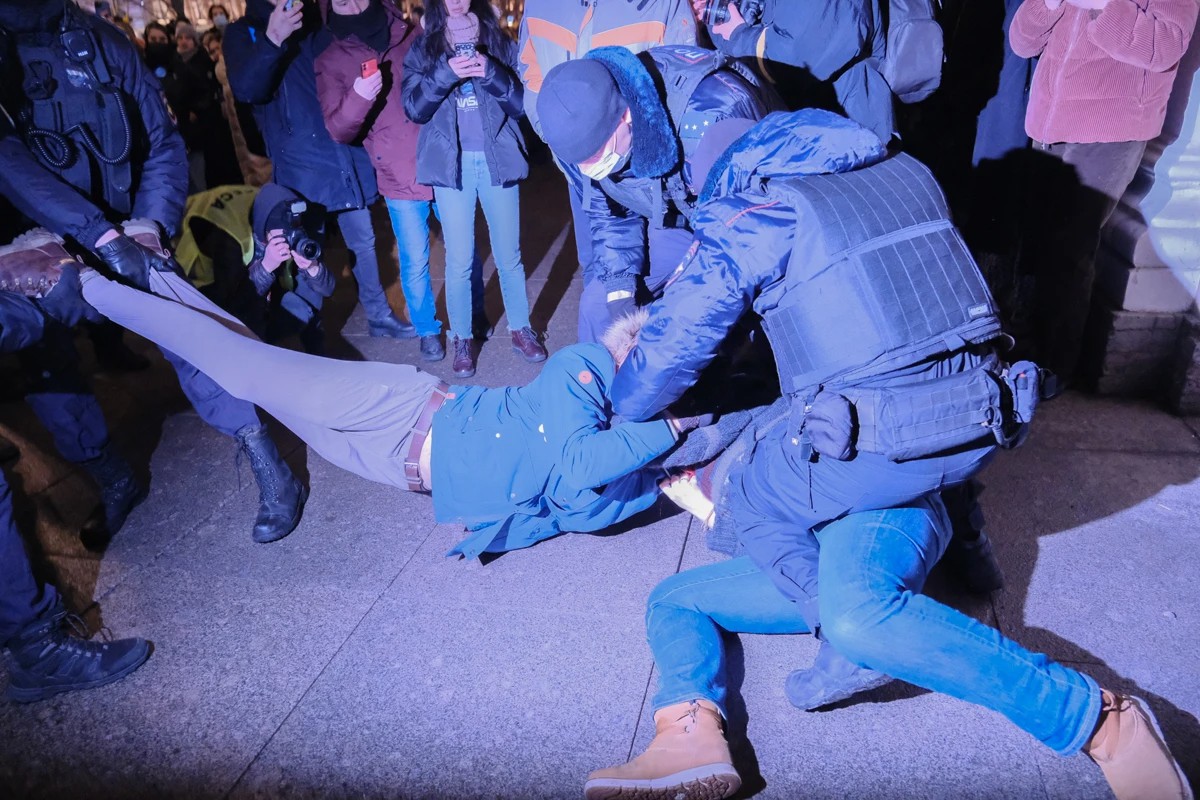
Detention during the call-for-peace in Ukraine action in Petersburg. Photo by Artem Leshko / Novaya Gazeta
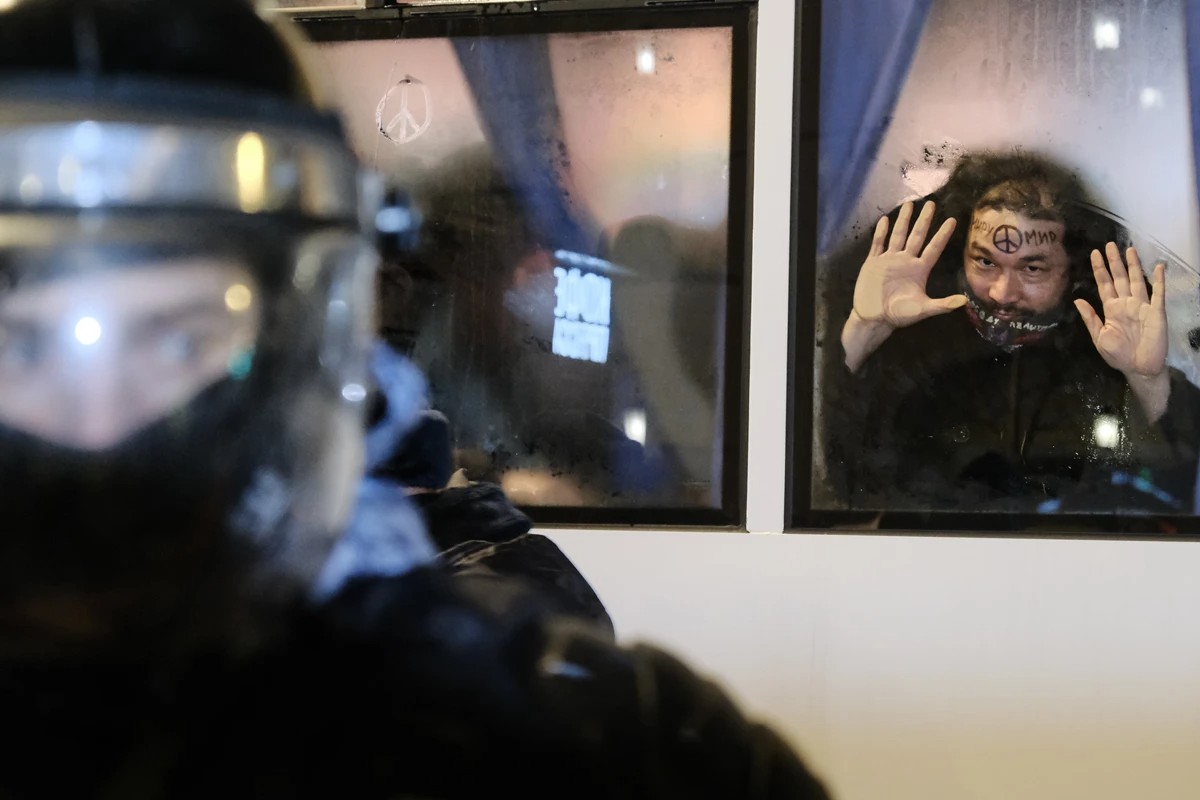
Detention during the call-for-peace in Ukraine action in Petersburg. Photo by Artem Leshko / Novaya Gazeta
Eco-activist Arshak Makichyan and editor of DOXA magazine Alla Gutnikova are among those who have spoken out against the war on social media. Each of them amplified Ukrainian voices: Alla read the work of Ukrainian author Stana Korunna, and Arshak spoke with his girlfriend Arina, who lives in Ukraine, for a post. “Hundreds of people reacted to our post, but this is not enough”, said Arshak, “Obviously, speaking out against the actions of the authorities is scary, but it is also obvious that if you do not speak out, the situation will be much worse.”
PETITIONS. On February 13, the liberal-leaning party Yabloko launched a petition against the war with Ukraine. Their statement read: “There will be coffins and funerals on both sides of the Russian-Ukrainian border, grief for mothers, wives and children! Each of us, each of you bears the full responsibility for ensuring that this does not happen!”. As of today, the petition has gained more than 20 thousand signatures.
Read Kolobakina and Sviridov’s full report here, Kozlova’s report here, and our report from St. Petersburg here.
Instead of Backstories: How We Got Here
Instead of our usual backstories for each theme, we instead offer a recap of how we ended up with a brutal, unprovoked, war in the heart of Europe. On the night of February 24 — early morning on the 25 Moscow time — President Putin announced a “special military operation” in Ukraine. The address echoed a disturbing speech he had made three days before, laden with historical distortions, in which he denied Ukraine’s existence as a sovereign nation and claimed that it was ‘invented’ by Bolshevik leader Vladimir Lenin.
It marked the culmination of 7 years of Kremlin attempts to attack and undermine Ukraine which, since the Revolution of Dignity in 2014, has been a thriving democracy with clear pro-Western and pro-European orientation. It also marks the failure of major Western powers like the United States, the United Kingdom, France, and Germany to adequately punish the Kremlin for its lethal interference. Putin’s broadcast occurred at the same time as an extraordinary meeting of the UN Security Council which — in a dark twist of irony — was being chaired by Russia. On February 24, Russia officially recognised the so-called Donetsk and Luhansk “People's Republics”. The breakaway territories emerged after the 2014 revolution as part of the Kremlin attempt to preserve political and economic control over the country. The presence of Russian troops on the ground is well-documented, including by Novaya. Since their occupation of Eastern Ukraine and the annexation of Crimea, the Kremlin has controlled more than 7% of Ukrainian territory. With the renewed invasion that has seen attacks on almost all major Ukrainian cities, there is a real prospect that this percentage will grow.
Before the renewed invasion, the seven-year war had left approximately 13,500 dead, 1.6 million internally displaced, and over 800,000 refugees. With no end to the current Russian onslaught in sight, these numbers will soar.
This newsletter drop is written and edited by several journalists at the Novaya Gazeta newsroom. Please, support our work by promoting our newsletter with #RussiaExplained hashtag on social media.
To keep up with Novaya Gazeta’s reporting throughout the week, you can follow us on Facebook, Twitter, Instagram, and Telegram. Our video content is available on Youtube and don’t forget to visit our website for the latest stories in Russian.
The Novaya Gazeta Team
Поддержите
нашу работу!
Нажимая кнопку «Стать соучастником»,
я принимаю условия и подтверждаю свое гражданство РФ
Если у вас есть вопросы, пишите [email protected] или звоните:
+7 (929) 612-03-68